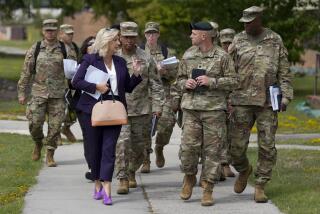U.S. put on the defensive
- Share via
WASHINGTON — The aerospace and defense sector is bracing for a potential brain drain over the next decade as a generation of Cold War scientists and engineers hits retirement age and not enough qualified young Americans seek to take their place.
The problem -- almost 60% of U.S. aerospace workers in 2007 were 45 or older -- could affect national security and even close the door on commercial products that start out as military technology, industry officials said.
Although U.S. universities are awarding 2 1/2 times more engineering, math and computer science degrees than they did 40 years ago, defense companies must compete with the likes of Google Inc., Microsoft Corp. and Verizon Communications Inc. for the best and the brightest.
“It’s about choices,” said Rich Hartnett, director of global staffing at Boeing Co. “There are so many more options today with a proliferation in the kinds of degrees and career paths that people can follow.”
Industry leaders are emphasizing the allure and growing importance of jobs linked to national defense.
Aerospace Industries Assn. Chief Executive Marion Blakey said the U.S. could face another “wake-up call,” similar to the 1957 Soviet launch of Sputnik, the world’s first satellite.
China’s success in shooting down one of its satellites last year, as well as the upcoming retirement of the U.S. space shuttle fleet, signal that the country cannot afford to take its technological and military superiority for granted, said Blakey, former head of the Federal Aviation Administration.
In addition to fierce competition from all corners of corporate America for a limited pool of math and science experts, contractors working on classified government programs are hamstrung by another factor: restrictions on hiring foreigners or off-shoring work to other countries.
“The ability to attract and retain individuals with technical skills is a lifeblood issue for us,” said Ian Ziskin, corporate vice president and chief human resources and administrative officer for Century City-based Northrop Grumman Corp.
Ziskin estimates that about half of Northrop Grumman’s 122,000 workers will be eligible to retire in the next five to 10 years. The trend is the same at Lockheed Martin Corp. of Bethesda, Md., which could lose as much as half of its workforce of 140,000 to retirement over the next decade. At Chicago-based Boeing, about 15% of the company’s engineers are 55 or older and eligible to retire now.
The launch of Sputnik set off panic that the U.S. was falling behind in the space race. And it swelled the ranks of aerospace and defense workers as a wave of Americans answered a call to help the U.S. regain military superiority and began careers building rocket ships and missiles.
In 2005, U.S. universities awarded 196,797 undergraduate and graduate degrees in engineering, math and computer science, according to the Commission on Professionals in Science and Technology. That’s up sharply from 77,790 degrees in 1966. But competition for those graduates is more intense than ever.
Defense companies today are competing with Google and Microsoft -- not to mention Wal-Mart Stores Inc. and the Navy -- for computer science majors, said Kimberly Ware, associate director for employer relations at Virginia Tech. They are vying with General Electric Co., Westinghouse Electric Corp. and the big automakers for electrical and mechanical engineering graduates, she said.
For its part, Boeing is up against telecom giants such as Verizon and Sprint Nextel Corp. as it grows its satellite business. It even competes with video game makers such as Electronic Arts Inc. for 3-D graphic designers and software programmers.
At the same time, defense executives acknowledge, the sector does not exert the same patriot pull as it once did because young people today have never known a time when the U.S. was not a leader in space exploration or the world’s sole superpower.
And unlike technology companies, defense companies generally have to hire U.S. citizens because they need employees who can obtain security clearance. This eliminates foreign graduates of American universities and foreign employees in the U.S. on H-1B visas.
“The talent is going to have to be homegrown,” said Blakey of the aerospace association.
Similarly, defense contractors cannot outsource to countries with more technical workers, such as India or China.
Against this backdrop, defense companies are reaching out to American students in the earliest grades. Lockheed Martin is sending employees into elementary schools to tutor students in math and science and is recruiting high school students to shadow Lockheed workers on the job.
Defense contractors are also trying to market themselves to job candidates with flexible schedules, tuition reimbursement programs and plenty of opportunities for advancement. Above all, said Linda Olin-Weiss, director of staffing services at Lockheed Martin, the defense industry offers “challenging work on programs of national importance.”
More to Read
Inside the business of entertainment
The Wide Shot brings you news, analysis and insights on everything from streaming wars to production — and what it all means for the future.
You may occasionally receive promotional content from the Los Angeles Times.










